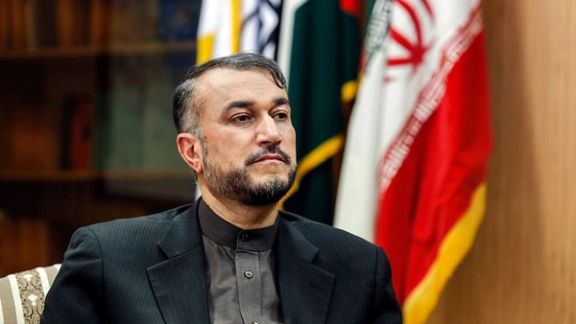Iran Wants To See 'Tangible Results' Of US Good Will: Foreign Minister

Iran's foreign minister reiterated Sunday that the US move to waive some sanctions was good, but Iran wants to see tangible results and lifting of sanctions.

Iran's foreign minister reiterated Sunday that the US move to waive some sanctions was good, but Iran wants to see tangible results and lifting of sanctions.
In an interview with the state-run television (IRIB), Hossein Amir-Abdollahian reiterated that executive orders or actions that restore the conditions to what they were before the US withdrew from the 2015 nuclear deal -- Joint Comprehensive Plan of Action (JCPOA) -- are considered as positive by Iran but what matters to Iran is seeing action from the American side, not "what happens on paper".
"For us it is important to see, tangibly and factually, the result of US moves in lifting the sanctions," he said, adding that so far Iran has not seen "serious and considerable initiatives" from the US side. "Initiative to us means what is observable in the talks with the 4+1 (France, Germany, Britain, Russia and China) in the non-papers exchanged between Iran and the US through the EU or when we can see some of the sanctions lifted in practice," he said.
Britain, France and Germany on Saturday urged Iran to grab the opportunity provided by the US move to restore the 2015 nuclear deal.
“This should facilitate technical discussions necessary to support talks on JCPOA return in Vienna,” negotiators of the European Troika said in a joint statement Saturday.
“We urge Iran to take quick advantage of this opportunity, because the timing of the waiver underscores the view we share with the US: we have very little time left to bring JCPOA talks to a successful conclusion.”
The EU foreign policy chief Josep Borrell said in a tweet Saturday that he had held an important call with Amir-Abdollahian ahead of the resumption of talks. "We need good faith, efforts from all sides, and a spirit of compromise to swiftly conclude the negotiations and go back to full implementation of the JCPOA," Borrel said.
According to state-run Press TV, in his phone talk with Borrell, Amir-Abdollahian reiterated that positive developments have taken place since the last round of negotiations in Vienna, but said such developments still fall short of meeting Iran's expectations.
The waivers allowed Russian, Chinese and European companies to continue cooperating with Tehran's non-proliferation projects including electricity generation at Bushehr nuclear power plant, Arak heavy water production facilities, and the Tehran Research Reactor. The Trump administration which pulled out of the JCPOA in May 2018 rescinded the waivers in 2019 and 2020 as part of his "maximum pressure" campaign.
The eighth round of Vienna talks broke on January 8 and negotiators returned to their capitals for consultations. Talks are expected to resume next week.
The Russian envoy to the talks in Vienna, Mikhail Ulyanov described the US decision to restore the nuclear waivers as "a move in the right direction" and said it would help expedite restoration of JCPOA and mutual return of US and Iran to compliance with 2015 deal. "It also can be seen as an indication that the Vienna talks have entered the final stage,”, he wrote on Twitter.
"Some believe that the move by the Biden administration is in fact in line with the White House's ‘blame game’ and cannot have positive effects on Iran's economy," Iran's state-funded Mehr News Agency said Sunday.
The Biden administration's decision raised a barrage of criticism from critics as a concession to Iran. A senior State Department official familiar with the waivers told the Associated Press Saturday that the move was not a “concession”, nor was it a signal that the US was about to reach an understanding on a mutual return to full implementation of the JCPOA.